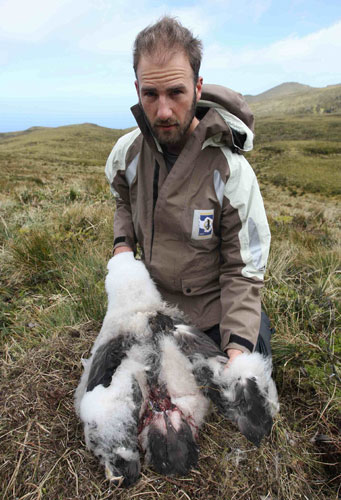Over 15-16 March BirdLife South Africa and the University of Cape Town's Percy FitzPatrick Institute hosted a conference "Frontiers in South African Ornithology" in Port Elizabeth, Eastern Cape. Four presentations were given that will be of interest to the Albatross and Petrel Agreement.
Mia Cerfonteyn (Percy FitzPatrick Institute) spoke on her Master's project which looked at the changing population status of Subantarctic Skuas Catharacta antarctica at South Africa's Marion Island following the eradication of feral cats Felis catus in the mid-1990s. Her results show a halving of the skua breeding population since the 1980s which suggests that burrowing petrels, a significant part of their diet, have not yet recovered from predation by cats. This year the FitzPatrick Institute will commence a new burrowing petrel project to ascertain more closely what has happened to their numbers, including of the ACAP-listed White-chinned Petrel Procellaria aequinoctialis, since the demise of the last cat.
Bronwyn Maree (Albatross Task Force, BirdLife South Africa) discussed seabird bycatch in the South African trawl fishery for hake Merluccius spp. A total of 782 trawls was observed on 64 trips during 2006-2010. Preliminary results suggest that mortality rates of seabirds from interactions with trawl warps have not changed since the previous five-year period, although fewer albatrosses are now being killed. Findings showed the necessity to having bird-scaring lines deployed during trawl setting, as well as during hauling.
Ross Wanless (Seabird Division, BirdLife South Africa) presented a paper on behalf of Tshikana Rasehlomi (Albatross Task Force, BirdLife South Africa). The presentation addressed seabird bycatch in pelagic longline fishing and showed the advantages of using ‘safe leads' in reducing injury to fishers and thus allowing for increased weighting of the branch line. It also demonstrated that increasing line weighting from 60-g to 150-g weights to increase sink rate did not adversely affect catch rate of target fish. This is a significant finding that should help persuade fishers that there are no adverse economic consequences to adopting adequate line weighting as a mitigation measure.
Ross also spoke on the plight of the Tristan Albatross Diomedea dabbenena on Gough Island whose chicks are attacked by introduced House Mice Mus musculus. It turns out that whereas the effects on the albatross are devastating, the importance of a seabird diet to mice is not high. This suggests that mouse attacks will not decrease as the albatross population does: a worrying conclusion.
A side meeting at the conference led to agreement to resuscitate the African Seabird Group, with Ross Wanless as its Interim Chair. Plans were laid to establish a web site and a Facebook page, and consideration was given to preparing a bid to host the next World Seabird Conference in Cape Town, South Africa.

Tristan Albatross dying from an attack by House Mice
Photograph by Peter Ryan
Presentations on albatrosses and petrels:
Cerfonteyn, M & Ryan, P.[G.] Subantarctic Skua Catharacta antarctica lonnbergi population status and diet two decades after the feral cats Felis catus eradication on Marion Island.
Maree, B, Wanless, R.[M.], Sullivan, B., Yates, O., Bergh, M., Gaylard, J. & van der Merwe, T. Seabird bycatch in the South African deep-water hake trawl fishery.
Rasehlomi, T., Goren, M., Maree, B., Sullivan, B., Wanless, R.[M.] & Yates, O. The economics of seabird bycatch mitigation in longline fishing - an experimental comparison of two weighting regimes.
Wanless, R.[M.] A surprising asymmetry in the relationship between predatory mice and their Tristan Albatross prey.
Click here to access the abstracts of the above papers, and of others presented at the conference.
John Cooper, ACAP Information Officer, 16 March 2012, updated 22 March 2012

 English
English  Français
Français  Español
Español